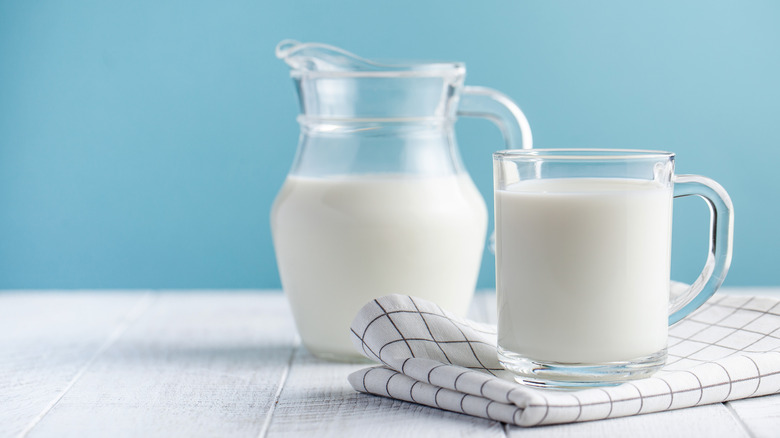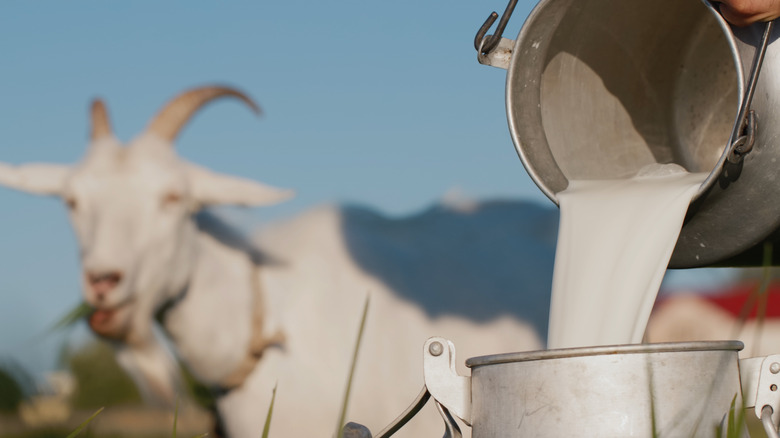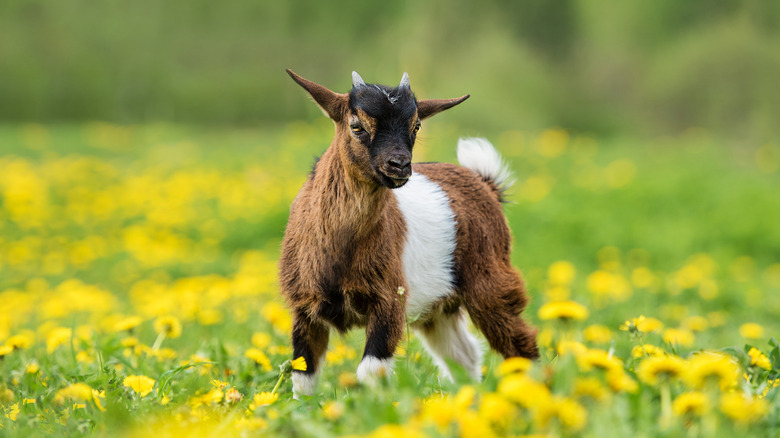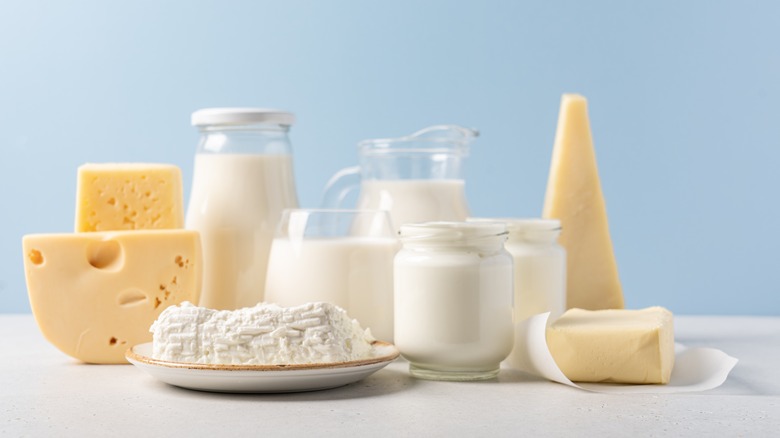Most Of The World's Goat Milk Comes From This Country
When you think of milk, the odds are that "cow" or maybe even "oat" and "almond" come to mind. These are the kinds of milk Westerners are most familiar with, and we often have a handful of choices at Starbucks or our favorite local coffee shops. Various milk options are available, but those in the West never consider the possibility of goat milk listed cheerily alongside half-and-half and oat milk brands as options on a barista's chalkboard. But maybe one day it will be!
The Agricultural Marketing Resource Center says that goat dairy products have seen a steady upward trend, but it is still no match for the plant-based and cow milk flooding the current market. However, one country has fully embraced the power of goat milk and all it has to offer. According to the Food and Agricultural Organization of the United Nations, India is currently the world's largest milk producer, and part of that includes its ever-growing goat milk production.
India is the top producer of milk
The Food and Agricultural Organization of the United Nations lists India, Bangladesh, and Sudan consecutively as the three largest raw goat milk-producing countries. Goats are a common animal in these countries, especially in India, where livestock is essential in rural areas. According to Science Alert, India's farmers raise at least twenty goat breeds in the country, but Jamunapuri, Barbari, Beetal, Surti, and Jakhrana are primarily used for their high-quality milk.
In 2019, India was reported by The Science Agriculture to have produced upwards of 5,400,000 tons of goat milk, followed by Bangladesh, which produced 2,750,000 tons. Around 65% of dairy consumed worldwide comes from goats. It is especially popular in developing countries where the animal is easier and cheaper to take care of than cattle (via American Institute for Goat Research). The goat is easier to maintain, but its milk also gives impoverished communities the vital nutrients malnourished individuals need to survive. Because of its health benefits and affordable price in India, Gaon Connection says that demand for goat milk has increased substantially.
The history of goat milk
It may not surprise you that goats and their milk have been around for a long time. How long, you might ask? Well, the National Library of Medicine estimates that Capra hircus, also known as goats, were domesticated some 10,000 years ago during the Neolithic era. They are considered one of the oldest domesticated animal species on Earth, only beaten out by dogs, which is a pretty cool title for a common goat to hold.
We've always relied on goats for their meat and milk throughout history. It is believed by Store it Cold that goats originated from a Middle Eastern species called Capra aegagrus and have traversed the globe, having been transported to the Americas during the Columbian exchange and roams all continents, except for the chillingly brutal lands of Antarctica. Gandhi even had a moment when he swore off cow and buffalo milk yet agreed to partake in goat's milk, again setting this particular animal product apart from other livestock (via Scroll.in).
Goat milk contains less lactose and is easier to process
What makes goat milk so different from cow milk besides the animal producing it? The answer is: quite a lot. First and foremost, 65% of the world's population is diagnosed with lactose intolerance. While goat's milk contains significant lactose, it has less than cow's milk and has been proven easier to digest (via Prevention). So, if you're mildly bothered by lactose, give goat cheese and goat's milk a try to see if your digestion symptoms are reduced.
According to Healthline, there are other significant differences between goat's and cow's milk. Goat's milk has 20 or more calories than cow's milk per cup, a gram more protein every eight ounces, and total fat, carbs, and calcium! The health site also reports that goat's milk may allow the body to absorb outside nutrients better, while cow's milk interferes with absorption. At the basic level, cow and goat milk are both made up of water, protein, fat, and lactose. Still, overall, goat milk is easier to process, less likely to set off lactose-sensitive people and contains all the lovely and essential amino acids, calcium, minerals, and vitamins we need to thrive (Summer Hill Goat Dairy).



